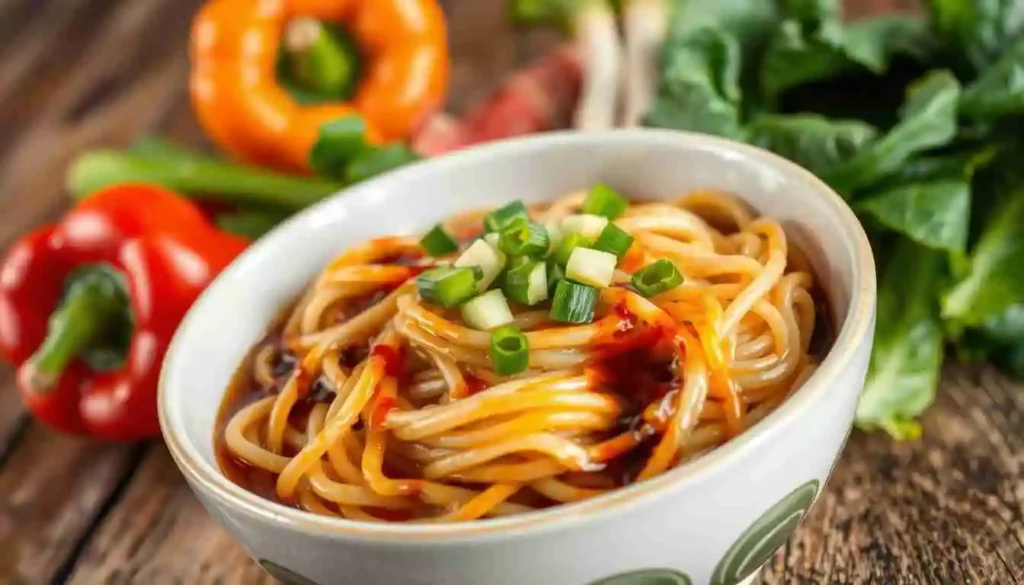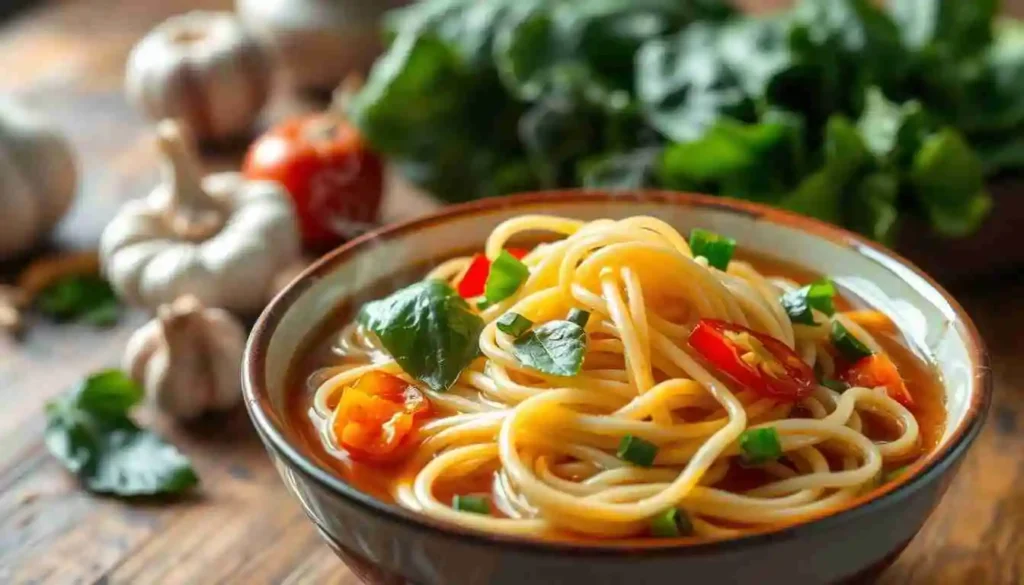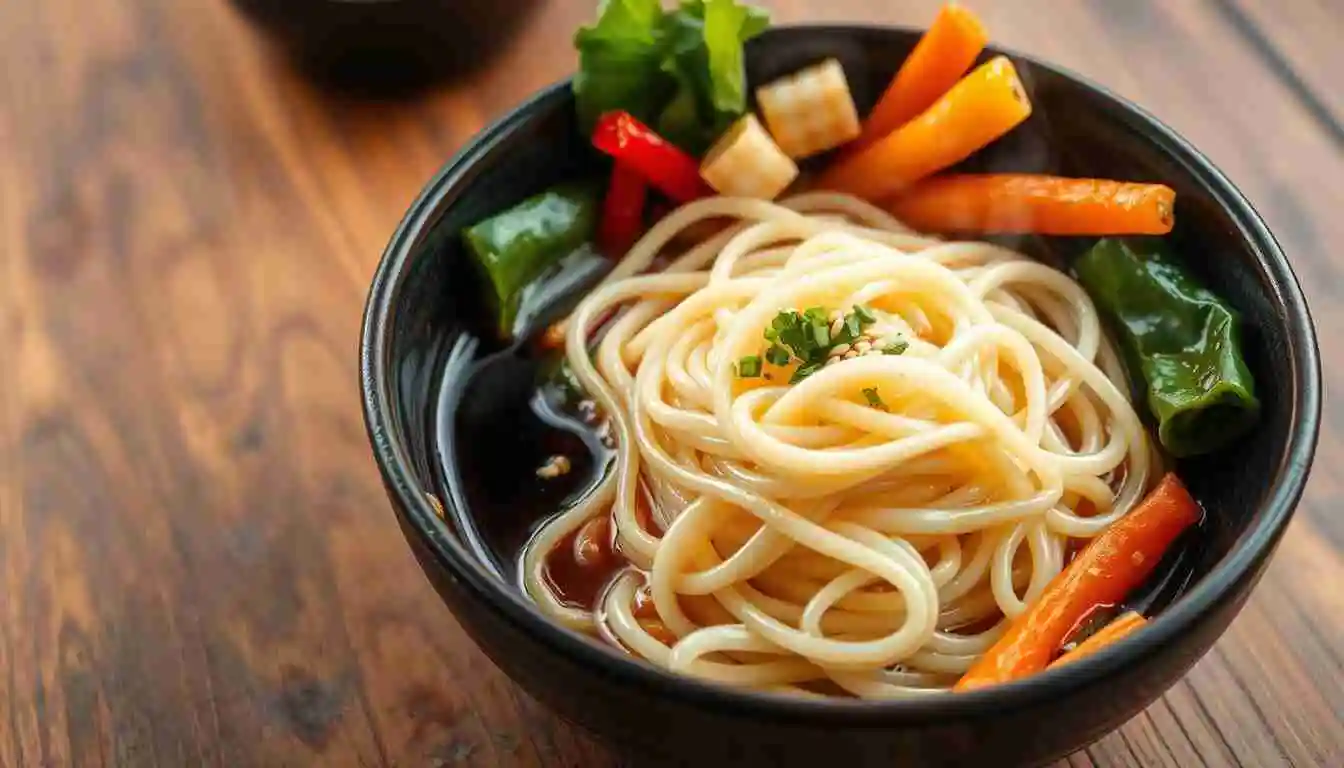Ho Fun Noodles: Types and Cooking Tips
I love noodles, and ho fun noodles are my favorite. They have a special texture and taste that’s different from other noodles. In this guide, we’ll dive into ho fun noodles. We’ll look at their types, how to cook them, and the delicious dishes they make.
Table of Contents
What are Ho Fun Noodles?
Defining Ho Fun Noodles
Ho fun noodles are a type of wide, flat rice noodle from Cantonese cuisine. They are made from rice flour and water, giving them a smooth, slippery feel. These noodles are wider and thicker than other types, like rice vermicelli or mei fun, measuring about 1/2 to 1 inch wide.
Differences Between Ho Fun and Other Noodle Types
Ho fun noodles stand out in several ways:
- Texture: They have a smooth, slippery texture, unlike chewier udon noodles or delicate mei fun.
- Cooking Method: Ho fun noodles are often stir-fried or used in noodle soups. Mei fun and vermicelli are commonly used in cold salads or stir-fries.
- Flavor: Ho fun noodles have a neutral flavor. This lets them soak up the flavors of sauces and ingredients they’re cooked with.
“Ho fun noodles are a versatile ingredient in Cantonese dishes, from stir-fries to soups. Their unique texture and ability to soak up flavors make them a staple in many Chinese kitchens.”
Varieties of Ho Fun Noodles
There are many types of ho fun noodles, each with its own special qualities. They are made fresh every day. This makes them soft and tender, perfect for Cantonese stir-fries and noodle dishes.
- Dried Ho Fun: Dried ho fun noodles are chewier. They’re great for soups or stir-fries that cook for a while.
- Rice Stick Noodles: Also called rice sticks or banh pho, these are wide, flat rice noodles. They’re similar to ho fun.
- Rice Flour Noodles: Made from rice flour and water, these noodles are smooth and silky. They feel a lot like ho fun.
Dried ho fun is best for dishes that cook longer. The fresh, tender types are great for quick stir-fries and noodle dishes. Rice stick and rice flour noodles can replace ho fun in many recipes. They offer similar taste and texture.
Knowing the differences between these ho fun noodle types helps you pick the best one for your dishes. This ensures a wonderful dining experience.
Popular Ho Fun Noodle Dishes
Ho fun noodles are a base for many tasty dishes. They range from classic Cantonese to modern twists. Two favorites are beef ho fun and seafood ho fun.
Beef Ho Fun Noodles
Beef ho fun noodles, also known as “choy yeun ngau ho,” is a favorite in Cantonese cuisine. It combines tender beef, ho fun noodles, veggies, and a savory sauce. The beef is marinated, and the noodles are stir-fried for a chewy texture.
Seafood Ho Fun Noodles
Seafood ho fun noodles swaps beef for shrimp, fish balls, or squid. It’s stir-fried with noodles, veggies, and a tasty sauce. This dish is light and aromatic, offering a unique take on ho fun noodles.
Beef or seafood, ho fun noodle dishes are a hit. They’re a delicious way to enjoy this Chinese staple.
Selecting and Preparing Ho Fun Noodles
When picking ho fun noodles, you can go for fresh or dried. Fresh ho fun noodles are softer and more tender, great for Cantonese stir-fries. Dried ho fun noodles are chewier and better for soups or longer stir-fries. Here are some tips to prepare them well:
Fresh vs. Dried Ho Fun Noodles
Fresh ho fun noodles come in big sheets or clumps. It’s key to separate them before cooking to avoid sticking. Dried ho fun noodles need a quick soak in hot water to soften before stir-frying.
Tips for Preparing Ho Fun Noodles
- Soak dried noodles: If using dried ho fun noodles, soak them in hot water for 6-8 minutes to soften them before stir-frying.
- Parboil fresh noodles: Some recipes may call for briefly parboiling fresh ho fun noodles to help them cook more evenly in the stir-fry.
By following these simple steps, your ho fun noodles will be just right, whether fresh or dried.

Cooking with Ho Fun Noodles
Stir-frying is a common method for ho fun noodles. It keeps their texture just right. When stir-frying ho fun noodles, remember a few key tips.
Stir-Frying Techniques
To get the perfect stir-fried ho fun noodles, follow these tips:
- Keep the noodles moving: Constantly toss and flip the noodles in the wok to prevent them from sticking or overcooking.
- Add oil generously: Use a generous amount of oil to help the noodles cook evenly and prevent them from sticking.
- Stir-fry over high heat: Cook the noodles over high heat to create a slightly charred, chewy texture.
Sauce and Seasoning Tips
The sauce and seasonings used in ho fun noodle dishes are key for flavor. Common ingredients include:
- Light and dark soy sauce: These sauces add depth and umami to the dish.
- Oyster sauce: This savory sauce coats the noodles, providing a rich, balanced flavor.
- Sesame oil: A small amount of toasted sesame oil adds fragrance and nutty notes.
- White pepper: Ground white pepper is often used to season ho fun noodle dishes.
Mastering these stir-frying techniques and using the right sauces and seasonings will help you make delicious ho fun noodle dishes at home.
Ho Fun Noodles: Types and Cooking Tips
Ho fun noodles come in fresh and dried forms. Each type has its own texture and cooking needs. Fresh noodles are soft, while dried ones are chewier.
To get the right texture, separate the noodles and parboil if needed. This ensures even cooking. Stir-frying over high heat and using the right sauces enhance their flavor.
| Fresh Ho Fun Noodles | Dried Ho Fun Noodles |
|---|---|
| Soft and tender texture | Chewier bite |
| Require less preparation time | May need parboiling for desired texture |
| Best for quick stir-fries | Suitable for a variety of cooking methods |
The secret to great ho fun noodles is in the cooking. Stir-frying with the right sauce brings out their flavors. Whether it’s beef or seafood ho fun, the right techniques make a big difference.
“The secret to delicious ho fun noodles is all in the preparation and cooking. Separating the strands and stir-frying over high heat with the perfect sauce brings out the best in these versatile noodles.”
Knowing the difference between fresh and dried noodles helps. The right cooking methods make your ho fun dishes tasty and satisfying.
Variations and Serving Suggestions
Ho fun noodle dishes can be customized with different proteins or veggies. You can swap beef for chicken, pork, shrimp, or tofu. Try adding bok choy, broccoli, bean sprouts, or mushrooms for a twist.
These dishes are great as a main course or with sides for a full meal. Pair them with steamed rice, egg drop soup, spring rolls, or dumplings. These options enhance the flavors and textures of your ho fun noodle dish.
Protein and Vegetable Substitutions
- Chicken
- Pork
- Shrimp
- Tofu
- Bok choy
- Broccoli
- Bean sprouts
- Mushrooms
Complementary Side Dishes
- Steamed rice
- Egg drop soup
- Spring rolls
- Dumplings
| Key Ingredients | Quantity |
|---|---|
| Ho Fun Noodles | 1 lb |
| Beef (flank steak) | 1/2 lb |
| Soy Sauce | 2 tbsp |
| Oyster Sauce | 1 tbsp |
| Sesame Oil | 1 tsp |
| Bean Sprouts | 1 cup |
| Onion | 1 medium, sliced |
Beef chow fun recipe comes together in under 15 minutes, perfect for quick and easy weeknight meals.
“The sauce for beef chow fun contains dark and light soy sauce, oyster sauce, among other key ingredients.”
Storing and Reheating Ho Fun Noodles
Ho fun noodles taste best when fresh, but you can still enjoy leftovers. Fresh noodles don’t last long and can get mushy. Dried noodles, however, keep longer and can be stored in a sealed container.
There are a few ways to reheat ho fun noodles. You can use the microwave for a quick fix. Or, you can stir-fry them in a wok to keep them fresh and prevent sogginess.
- For microwave reheating, place the noodles in a microwave-safe dish, add a splash of water, and cover the dish. Heat in the microwave for 1-2 minutes, stirring halfway, until the noodles are heated through.
- For stir-frying, heat a wok or large skillet over high heat. Add a small amount of oil and stir-fry the noodles for 1-2 minutes, tossing constantly to prevent them from sticking or becoming mushy.
| Noodle Type | Shelf Life | Storage |
|---|---|---|
| Fresh Ho Fun Noodles | Shorter | Prone to becoming mushy if stored for too long |
| Dried Ho Fun Noodles | Longer | Can be stored in an airtight container |
By following these tips, you can enjoy delicious ho fun noodle leftovers and make the most of your culinary creations.

Conclusion
Ho fun noodles add a delicious twist to Cantonese cuisine. Their wide, flat shape and smooth texture make them stand out. By learning about different types and how to prepare them, you can make many tasty dishes at home.
Whether you like beef, seafood, or veggies in your ho fun noodles, this guide has you covered. You now know how to pick the right noodles and stir-fry them perfectly. This will let you enjoy the bold flavors of ho fun noodles in your kitchen.
Keep trying new things with ho fun noodles. Mix up the proteins and veggies, and add some side dishes. With a bit of practice, you can make ho fun noodles even better. Your taste buds will thank you for the authentic flavors of this Chinese dish.

